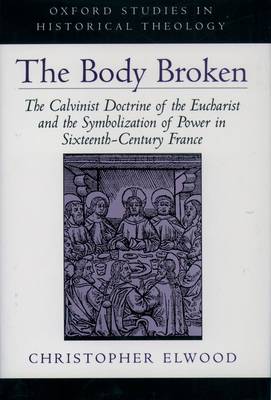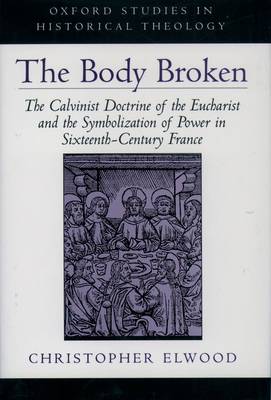
Door een staking bij bpost kan je online bestelling op dit moment iets langer onderweg zijn dan voorzien. Dringend iets nodig? Onze winkels ontvangen jou met open armen!
- Afhalen na 1 uur in een winkel met voorraad
- Gratis thuislevering in België vanaf € 30
- Ruim aanbod met 7 miljoen producten
Door een staking bij bpost kan je online bestelling op dit moment iets langer onderweg zijn dan voorzien. Dringend iets nodig? Onze winkels ontvangen jou met open armen!
- Afhalen na 1 uur in een winkel met voorraad
- Gratis thuislevering in België vanaf € 30
- Ruim aanbod met 7 miljoen producten
Zoeken
The Body Broken
The Calvinist Doctrine of the Eucharist and the Symbolization of Power in Sixteenth-Century France
Christopher Elwood
€ 271,45
+ 542 punten
Omschrijving
This book examines the disputes about the eucharist that were carried out in the popular press in 16th-century France. Elwood's focus is on the way in which power is symbolized in eucharist doctrine, and how representations of power in the context of theological discussion influenced understandings of power in other spheres of life. By concentrating on writings that were accessible to and likely read by a popular lay audience, Elwood seeks to discover what ideas concerning the eucharist were actually conveyed by readers. His central argument is that the Calvinist eucharist theory propounded in the 16th century included a way on construing power and the relation between the sacred and society that contributed in a very significant way to the ideological social, and political unrest that characterized the Reformation period.
Specificaties
Betrokkenen
- Auteur(s):
- Uitgeverij:
Inhoud
- Aantal bladzijden:
- 272
- Taal:
- Engels
- Reeks:
Eigenschappen
- Productcode (EAN):
- 9780195121339
- Verschijningsdatum:
- 21/01/1999
- Uitvoering:
- Hardcover
- Formaat:
- Genaaid
- Afmetingen:
- 161 mm x 236 mm
- Gewicht:
- 512 g

Alleen bij Standaard Boekhandel
+ 542 punten op je klantenkaart van Standaard Boekhandel
Beoordelingen
We publiceren alleen reviews die voldoen aan de voorwaarden voor reviews. Bekijk onze voorwaarden voor reviews.











